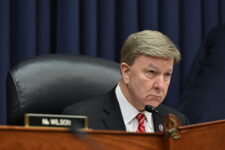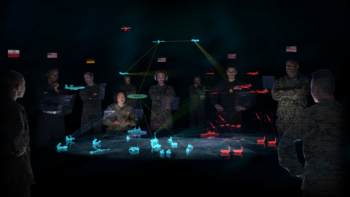 CAPITOL HILL: The rumor has been rife for weeks: Cyber Command is about to be elevated to a command equal to the powerful regional combatant commands such as Central and Pacific Commands.
CAPITOL HILL: The rumor has been rife for weeks: Cyber Command is about to be elevated to a command equal to the powerful regional combatant commands such as Central and Pacific Commands.
This would make what many observers regard as the natural maturation of the increasingly important command, as well as its separation from the Intelligence Community. But in his prepared testimony today, Sen. Carl Levin, chairman of the Senate Armed Services Committee, signaled the Pentagon that — while he knows “there is a proposal before the Secretary of Defense to elevate Cyber Command” — he has concerns about the command remain given “the immaturity of the command and cyber policy framework.” That seems to be a reference to the administration’s continuing failure to clearly delineate the chain of command and separation of operations between the military, the intelligence community and domestic bodies such as the Department of Homeland Security.
During the hearing, Chairman of the Joint Chiefs Gen. Martin Dempsey appeared to agree with Levin, saying: “In 2020, I’m sure people will say, of course, it should be an independent command. We just aren’t there yet.” So it sounds as if the president’s top military advisor would recommend against elevating the command.
If you want to get a clear idea of just how muddy the dividing lines are between the military, intelligence and domestic departments and agencies read today’s testimony by Janet Napolitano before the Senate Committee on Homeland Security and Governmental Affairs:
“In support of these efforts, DHS serves as the focal point for the U.S. Government’s cybersecurity outreach and awareness activities and is focused on the development of a world-class cybersecurity workforce as well as innovative technologies that sustain safe, secure, and resilient critical infrastructure.” We encourage readers to inform us and everyone else who follows cyber issues to clarify just what a “focal point” means in policy and command terms.
In his written testimony today, Levin noted that, “even when Cyber Command stands up its national cyber defense units, critical infrastructure is going to remain vulnerable to cyber attack, requiring owners and operators to work with the government pursuant to the President’s recent Executive Order to improve defense, increase resiliency and and redundancy and share threat information.” That’s the senator’s way of noting the cyber policy muddle without pointing too many fingers at his Democratic colleagues in the White House or those senators who scuttled the cyber bill last session.
Several congressional aides with knowledge of Cyber Command and of the Intelligence Community told me in the last few days that lawmakers are loathe to see elevation of Gen. Keith Alexander‘s command until he is gone. This isn’t about Alexander per se, they say, but about the fact that he is both director of the National Security Agency and of a military command.
Although the NSA is funded largely by the Defense Department, lawmakers remain nervous about too much overlap between leaders of intelligence agencies and leaders of the military. And that unease extends — in reverse — to the Intelligence Community. Readers will remember the kerfuffle when David Petraeus was named CIA Director and senior intelligence officials voiced concern about his military background and ties.
Connecticut lawmakers to grill Army, Lockheed about job cuts at Sikorsky helicopter unit
“The Connecticut delegation has questions about why, with that [FY24] appropriation in hand, this happened,” said Rep. Joe Courtney, D-Conn.


























